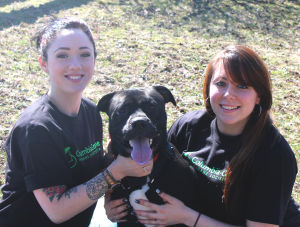Frustrated owners had progressively pursued positive reinforcement training, citronella and other kinds of no-bark collars, electronic collars, combinations of psychoactive drugs, doggie daycare, etc. The list in many of these cases, as well as the frustrations, were endless. When presented with an extensive and comprehensive scenario, after providing a counter-conditioning protocol that I’ve found to be reasonably effective, I recommended a veterinary consultation for a number of these clients. These canines were at risk for euthanasia, or a return to a rescue or shelter with another placement failure notch in their belt. All the families to whom I am referencing chose a surgical alternative. Bark softening surgery is a relatively simple procedure, with few complications statistically. Every dog, I repeat, every dog who was taken to surgery remained in their now forever home. One family who came to me from Rochester, whose new rescue was on his sixth and last home, had a consultation with a local vet practice, and stayed here for the procedure before returning home. One family sent to me from downstate was being evicted from their townhouse with a lovely German Shepherd Dog. They are now living happily ever after in that townhouse, with a successful surgical alternative behind them.
The American Veterinary Medical Association (AVMA) and the American Kennel Club (AKC) have supported the bark softening surgery as a humane solution to a very common, frustrating, and difficult behavior pattern to correct. Contact your state representatives immediately, telling them that appropriate veterinary procedures should never be subject to what has been referred to as “arbitrary” government regulation. The Assembly bill A1204-2013 has passed the Assembly and is now pending in the Senate Agriculture Committee as bill S2271-2013. We cannot allow our government officials to interfere in the sacrosanct health care decisions between our veterinarians and ourselves. This is a right and a freedom that must be protected at all costs. If not, the losers will be many of our companion animals. The Senators on the Agriculture Committee: P. Ritchie (Chair), P. Gallivan, T. Gipson, V. Montgomery, T. O’Mara, M. Ranzenhofer, J. Serrano, J. Seward, C. Tkaczyk, D. Valesky, and C. Young. Tell them you oppose bill S2271-2013. The domino effect of these types of undereducated legislative decisions is and will prove to be extremely perilous.
Feel free to call us with any questions at 518-828-6044, or visit our website at www.cghs.org. Stop down and see us at 125 Humane Society Road, off Route 66 (about a mile south of the intersection with Route 9H) in Hudson. Our hours are Monday, Tuesday, Thursday, Friday, and Saturday, 11:30 a.m. to 4 p.m., closed on Wednesday and Sunday. The food bank is open to any from the public in need of pet food or for those wishing to donate food anytime during business hours. All of our cats and kittens are “Furrever Free” with all expenses paid. Spay/neuter clinics for cats are $65 male or female, including a rabies vaccination and a 5-in-1 feline distemper combination vaccination. Nail clipping services are available every Saturday from 10 to 11 a.m. at the shelter, no appointment necessary, for a donation of $5 for cats and $10 for dogs.
***
Charlene Marchand is the chairperson of the Columbia-Greene Humane Society/SPCA Board of Directors. She may be
contacted by email at [email protected].

 RSS Feed
RSS Feed